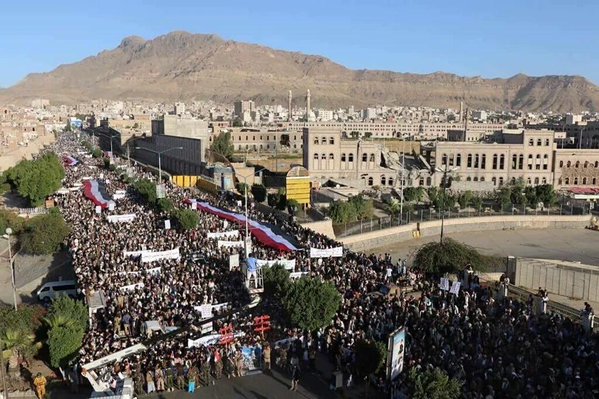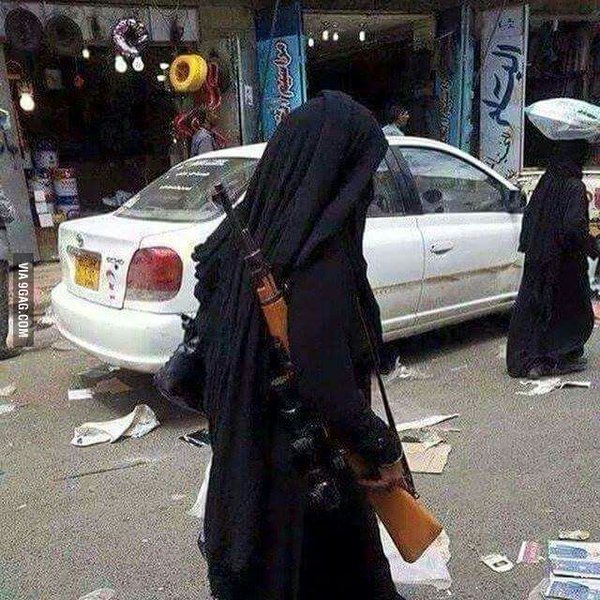Political Situation: North and South Yemen are progressively drifting apart
A few days ago, Abdrubbah Mansur Hadi, the exiled president, arrived by plane with several ministers in Aden – without any official reception as had already happened at his short visit in September. Hadi had been outside the country for altogether eight months which certainly has led to a hardly bridgeable alienation. He immediately retired to the recently refurbished and hermetically barred government palace in Aden, from where he refers to the Houthis as “dogs in their caves whom we will annihilate” and wants to supervise the siege of Taizz by Sudanese and Eritrean mercenary troops, led by Hamoud alMikhlafi, the Salafist resistance hero of Taizz.
Minister President and Premier Minister Khaled Bahah, while ever more conflicting with President Hadi, meanwhile visited Soqotra, inspecting the damage caused by the Chapala and Megh cyclones, before departing to Abu Dhabi where has was welcomed with full military honours reserved for heads of state. In a recent interview he voiced a conciliatory opinion vis-à-vis the Houthis and shifted the enemy image to the proliferating terrorism of alQaida and Daash.
Daash admitted having caused the bloody attack on a military campus of the government on 20th November at the section between Shibam in Handramaut and Marib near the diversion to Saudi Arabia. Insiders opine that this assault had not been instigated for military reasons but rather for the purpose of controlling the smuggler routes which lead from Mukalla to the South of Saudi Arabia.
Hadi or Bahah
Although Hadi is as much disliked in Aden as all over the country he still enjoys more popularity than Bahah who is suspected of some affinity with the Houthis, In Sana´a, however, where the situation is almost back to normal, Hadi has no backing whatsoever, is hated as has become obvious at a major demonstration on 21st November, with thousands of participants rallying against Hadi, Saudi Arabia and the USA. The indignation was refuelled by news that Saudi Arabia is receiving from the United States twice the amount of bombs previously already dropped over Yemen. Hadi´s repeatedly declared “legitimacy” of asking for Saudi aggression against Yemen and the start of the war, is being questioned to an ever increasing extent: not only his election in 2012 in the absence of an opponent, but also his resignation, followed by a resignation from his resignation, and, eventually, his claim to continue his presidency despite the expiration of his term of office on 15/02/2015, and his 8-month-exile in Ryadh in splendid luxury while the population in Yemen “went down to rack and ruin” at his instigation – convinced most Yemenis that Hadi is not an eligible candidate to bring about an end to chaos, misery and catastrophe in Yemen.
Sana´a, 21/11//2015: Demonstration against Hadi, Saudi Arabia and the USA ”supplying 20.000 further bombs to be dropped over Yemen“.
Geneva II negotiations delayed
The start of negotiations between the Yemeni adversaries – referred to as Geneva II –for the purpose of reaching a cessation of hostilities has been requested, announced, further delayed for weeks, giving rise to a growing speculation that the conflicting parties do not aspire a consensus. On the other hand it is rumoured that unofficial contacts are on-going.
While all outside interventionists, including the UN, the US, and Europe (motivated by dreading new agglomerations of refugees ) exert pressure to start negotiations without delay, the conflicting parties hesitate. The crucial point appears to be that Hadi´s fraction (and with him renegates of Moutamar government party, Islah and further somewhat more restrained party representatives) insist on implementing UN resolution 2216, which would oblige the Houthis to admit defeat. In turn, the Houthis have presented a 7-point programme providing for a transition phase for a political cooperation of the conflicting parties, with absolute priority to be given to re-establishing the country´s sovereignty. In actual fact the harshness of military disputes increases and each war party attempts to reach the best possible start position. The Houthies are gaining ground at present. On the other hand the Saudi allied forces have been replenished with various units of mercenaries and the outcome of the battle for Taizz will decide the negotiating positions. This confirms speculations that the country might be divided into several regions and the discussion will focus on frontier lines.
Ismael Ouid Sheikh Ahmad, the – rather weak – UN delegate for Yemen had been in Ryadh a short time ago, is in Teheran at present and will go on to Qatar, Kuwait, and the Emirates, a clear sign that the real conflict partners Saudi Arabia and Iran have more than a say in the development.
Exiled president Hadi´s fraction has already tabled a list of the delegates for the negotiations, consisting mainly of experienced party politicians of the toppled Saleh regime. The delegates represent the spectrum of “old parties” from the Salafist Rashad party to the economy-minded “Justice and reconstruction party”. The South is underrepresented as are the new associations formed during the revolution and the political dialogue. Meanwhile also Saleh, although no longer supported by a political power (while in exile his Moutamar party shifted to Hadi) but still engineering very strong military units, nominated five trusted persons for participation in the negotiations. The Houthis have so far not published a list of delegates but will no doubt send Mohamed Abdelsalam and Saleh alSamad as delegation leaders. Houthi spokesman Abdelsalam reiterated recently that the Houthis are keenly interested to promote a peaceful agreement since the war only produces death and destruction. The Houthis will thus be the only participants squeezing new staff into old power cartels.
The fractions of the conflicting parties keep accusing each other of sabotaging the meeting and the negotiations in Geneva. It is said that the event will be postponed to December.
The military status quo
The war propaganda machinery on both sides renders factual information next to impossible. War is going on at the following frontiers:
In Saudi Arabia fighting continues in the North of the Yemeni border in the provinces of Asir, Najran and Jizan, hushed up by the western press. Houthi-Affrash are involved in fighting Saudi border units having become reinforced by national guard troops. The Houthis have achieved impressive territory gains and destroyed numerous Saudi frontier towers, military installations and tanks and armoured vehicles. Saudi Arabia so far succeeded in keeping this hidden from the international press although the Houthi broadcasting station alMasira keeps issuing relevant photo material.
In Taizz and in the vicinity of the town obstinate fighting causes up to 50 dead persons daily on both sides. Houthi-Affash fight against resistant “Muqawama” under the leadership of Salafist and self-appointed Sheikh Hamoud alWikhlafi. His troops consist no longer of local resistance groups but ever more frequently of military Islah.
In the liberal town of Taizz the war has adopted a more sectarian character than elsewhere. Sudanese troops and possibly also “foreigners” such as Eritrean, Mauritanian and Columbian soldiers have also been sent from Aden to “liberate” Taizz. If and when they could be in a position to alter the situation in favour of Hadi is very dubious since it can hardly be assumed that the Taizz population will agree to be liberated by foreign occupation forces after months of horrendous deprivations. Both conflict parties have started to arm women and train them for battle.
UNHCR provides drinking water for the population in Taizz
Armed woman in Taizz. Both war parties train women to fight
South of Taizz a front line runs from Bab alMandab in the West till Shabwah, with the air force base in alAnad 12 km to the North of Aden as the focus of fighting. If the news can be trusted the Houthis are advancing. In laMocha on the Red Sea they successfully assaulted from ambush stationary “liberation” troops supposed to secure the Bab alMandab.
The Emirati represent the most active “protective power” at the time being in Aden. They have installed Patriot defence missiles in Marib and an outpost in Shabwah and could so far repel two Houthi-Affash missile attacks. Both in Marib and in the provinces of Abyan, Aden, Lahij and Taizz the Houthis deploy anti-personnel mines causing considerable injuries and mutilation of non-military victims, above all children.
The frontline in Marib, inaugurated by the Saudis six months ago in order to put the screws on Sana´a from Northeast and Northwest, still runs at a distance of approx. 30 km to the West of Marib. The Saudi troops appear to have dropped the project of besieging Sana´a although low level fighting is being continued. It can be taken for granted that the Saudis will take hold of Marib, keen on controlling oil and gas production.
The situation in Aden and Sana´a
Life has almost come back to normal in Sana´a with considerable shortcomings in the infrastructure though: Electricity stopped more than three months ago. When gasoline could not be bought for weeks either many Sana´anis purchased cheap mini solar plants to reload mobiles and watch TV by means of emergency lights. Schools have reopened but there are no international flights to and from Sana´a yet. Ports and airports remain blocked. Despite a total embargo at the Red Sea ports gasoline has been available at service stations in Sana´a since 18th November, raising the question of secret supplies or secret arrangements.
The Emirati troops in Aden were exchanged for stationary militia to guaranty the security of the returned Hadi government and keep alQaida and Daash at bay. In addition, more than 1,000 Sudanese and also Columbian and Mauritanian mercenaries have landed. The repeatedly announced and subsequently postponed recruitment of resistance fighters into the regular army and the security forces is said to take place as well. Reconstruction in Aden is very cumbersome, particularly since some districts on the peninsular are heavily damaged. Many refugees have returned though and a process of normalization has commenced with the – partly provisional – revival of school and university activities. The Emirates are extensively present and offer selective assistance, spectacularly covered by the media. Regular flights abroad are promised to commence in a near future.


